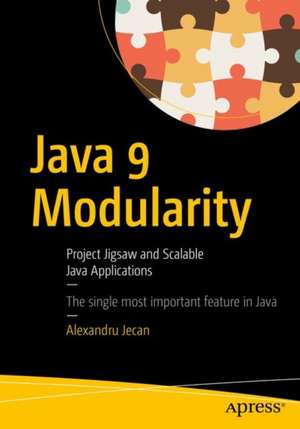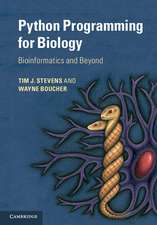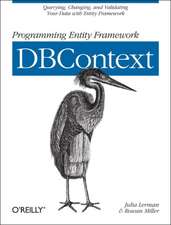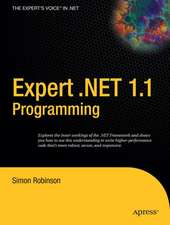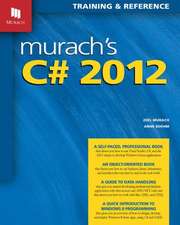Java 9 Modularity Revealed: Project Jigsaw and Scalable Java Applications
Autor Alexandru Jecanen Limba Engleză Paperback – 29 sep 2017
Until now Java has been monolithic. Using any one part of Java has meant incorporating the entirety of the runtime environment, an approach ill-suited to the increasing number of IoT devices such as fitness monitors, kitchen appliances, toys and games, and so forth. This book shows a new way, to make Java scale from the smallest of footprints in the smallest of devices through desktop PCs and on up to server platforms.
With Java 9 Modularity Revealed you will learn to make your projects more reliable and scalable than ever using the most important feature in Java 9—The Java Platform Module System, known more commonly as Project Jigs
This book provides code examples and explanations.
What You'll Learn
- Build Java applications using the new modular system introduced in Java 9
- Create your own JRE consisting only of the modules that you require
- Adapt your testing techniques toward modular applications lare your dependencies on other modules
- Enable modules to export only specific packages
- Migrate existing Java applications to modular ones
- Improve maintainability and performance of Java applications
Who This Book Is For
Experienced Java programmers wanting to keep up and become informed on the new modularity support in Java 9
Preț: 181.71 lei
Preț vechi: 227.15 lei
-20% Nou
Puncte Express: 273
Preț estimativ în valută:
34.77€ • 37.76$ • 29.21£
34.77€ • 37.76$ • 29.21£
Carte disponibilă
Livrare economică 01-15 aprilie
Preluare comenzi: 021 569.72.76
Specificații
ISBN-13: 9781484227121
ISBN-10: 1484227123
Pagini: 221
Ilustrații: XXVI, 221 p. 50 illus., 17 illus. in color.
Dimensiuni: 178 x 254 mm
Greutate: 0.45 kg
Ediția:1st ed.
Editura: Apress
Colecția Apress
Locul publicării:Berkeley, CA, United States
ISBN-10: 1484227123
Pagini: 221
Ilustrații: XXVI, 221 p. 50 illus., 17 illus. in color.
Dimensiuni: 178 x 254 mm
Greutate: 0.45 kg
Ediția:1st ed.
Editura: Apress
Colecția Apress
Locul publicării:Berkeley, CA, United States
Cuprins
Introduction.- Chapter 1: Modular Programming Concepts.- Chapter 2: Project Jigsaw.- Chapter 3: Modular JDK and Source Code.- Chapter 4: Defining and Using Modules.- Chapter 5: Modular Run-Time Images.- Chapter 6: Services.- Chapter 7: jLink: The Java Linker.- Chapter 8: Migration.- Chapter 9: The New Module API.- Chapter 10: Advanced topics.- Chapter 11: Testing Modular Applications.- Chapter 12: Integration with Tools.
Notă biografică
Alexandru Jecan is a software engineer, author, trainer, and speaker residing in Munich, Germany. He earned a degree in computer science from the Technical University of Cluj-Napoca, Romania. Alexandru provides professional in-house training on various software technologies across Germany. He also speaks at tech conferences and user groups, both in Europe and the US, on different topics related to software development. He was awarded the title of “Author of the Month” by the German JavaMagazine. Alexandru likes to read during his free time and to spend time with his family.
Textul de pe ultima copertă
Develop modular applications using the Java Platform Module System, the single most anticipated feature in Java 9. You will improve maintainability and performance of your Java applications by deploying only modules that are needed and encapsulating their implementation details.
ject Jigsaw. You will learn how to avoid one of the major pain points of Java programming, that of conflicting class names from different modules, or packages. You will learn to create custom run-time images that represent a minimal and more compact JRE containing only those modules that you need. You will further learn to migrate existing Java applications to modular ones using different approaches and tools. The end result is a new ability to plug together different modules without fear of namespace and other conflicts, and you can deploy to everything from small devices to large servers.
modules to export only specific packages
Migrate existing Java applications to modular ones
Improve maintainability and performance of Java applications
Until now Java has been monolithic. Using any one part of Java has meant incorporating the entirety of the runtime environment, an approach ill-suited to the increasing number of IoT devices such as fitness monitors, kitchen appliances, toys and games, and so forth. This book shows a new way, to make Java scale from the smallest of footprints in the smallest of devices through desktop PCs and on up to server platforms.
With Java 9 Modularity Revealed you will learn to make your projects more reliable and scalable than ever using the most important feature in Java 9—The Java Platform Module System, known more commonly as Pro
This book provides code examples and explanations.
What You'll Learn:
- Build Java applications using the new modular system introduced in Java 9
- Create your own JRE consisting only of the modules that you require
- Declare your dependencies on other modules
- Enable
Caracteristici
Presents the defining new and much-anticipated feature in Java 9 that all Java programmers will need and want to learn Covers a feature essential to using Java for connected devices and the Internet of Things Solves painful and longstanding problems around conflicting class names and class paths that have plagued Java programmers from the beginning
